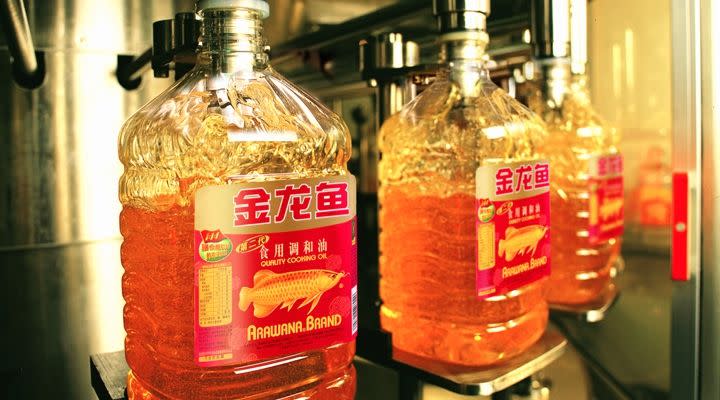Analysts lower Wilmar’s TP on lower earnings estimates

Wilmar will release its 2QFY2023 results on Aug 11.
Analysts from DBS Group Research and Maybank Securities have lowered their target price estimates for Wilmar International F34 as they see soft services demand from China and low crude palm oil (CPO) prices as downside risks ahead of the group’s 2QFY2023 results.
Wilmar will be releasing its financial report for the 2QFY2023 and 1HFY2023 ended June 30 on Aug 11.
Maybank’s Thilan Wickramasinghe writes that he expects the group’s net profit after tax (NPAT) momentum to decelerate further in its 2QFY2023 results, noting that the soft demand from China could “likely drive downside risks” to its wholesale food segment.
The Caixin China services purchasing managers index (PMI) in June was the weakest since January 2023, indicating that the country’s economic recovery is slowing. The weak figures indicate that consumers are cutting back their spending on services such as restaurants, which will have negative implications for Wilmar’s bulk food products segment in the 2QFY2023.
Falling palm oil prices, which was a key driver for Wilmar’s earnings in FY2021 to FY2022, may also affect margins of Wilmar’s plantation segment on a q-o-q basis.
The analyst has kept his “hold” call on the counter while lowering his target price to $3.99 from $4.27 previously. His target price is based on a higher weighted average cost of capital (WACC) of 5.6%, 1% terminal growth and a target P/E of 26x.
“Wilmar trades at a forward-P/E discount of 78% and 83% respectively to its China and India listings. However, we do not see a catalyst for this gap to close in the medium term given the ability of investors to directly participate in [the growth of China and India] through its listed subsidiaries,” he writes in his July 7 report.
“A continued weaker growth outlook in China coupled with seasonal production peak for palm oil (which could weaken prices further), should limit room for positive earnings momentum in FY2023, in our view,” he adds.
DBS’s William Simadiputra, on the other hand, has kept his “buy” call as he sees Wilmar recovering from its 1HFY2023 low on improving palm oil refining margins and stronger performance from Yihai Kerry Arawana starting 2HFY2023.
“Despite the short-term earnings weakness, Wilmar’s integrated food products platform has room to further to expand via its downstream division spanning consumer products to central kitchen. The downstream expansion has strong synergies with its regional upstream and midstream platform. Wilmar plans to build 20 central kitchens in China in the next five to six years,” he writes in his July 10 report.
Simadiputra is also expecting Wilmar’s earnings to improve to US$2 billion ($2.69 billion) or up 23% y-o-y in the FY2024 on further recovery of its tropical oil refining margin.
“We believe Wilmar be able to capitalize recovering edible oil market next year, driven by China edible oils demand recovery as well as supplies disruption from El Nino,” he says.
The earnings expansion should also lift Wilmar’s current share price, which “doesn’t value” the group’s developing integrated food products platform especially its downstream branded products and central kitchen expansion. With its share price currently close to Covid-19 levels, the analyst believes any temporary earnings weakness in FY2023 is “already priced in”.
However, Simadiputra has lowered his target price on Wilmar to $5.30 from $6.67 on lower earnings projections and multiple assumptions on its P/E for its earnings (sans China), which consists mostly of the tropical oil refining business.
“Our target price implies FY2024 P/E of 12x to account earnings recovery prospect in FY2024. Furthermore, we also like Wilmar’s journey to downstream business that set to create a more stable earnings platform ahead,” he says.
However, he warns that if Wilmar fails to capitalize on the recent low commodity prices, input costs may remain under pressure for food products and may cap the group’s share price performance.
Shares in Wilmar closed 1 cent higher or 0.27% up at $3.68 on July 10.
See Also:
Click here to stay updated with the Latest Business & Investment News in Singapore
DBS lowers STI target to 3,450; looks towards turnaround in 2H2023
GoTo's risk-reward balanced, BoFA initiates 'neutral' with TP of IDR125
Get in-depth insights from our expert contributors, and dive into financial and economic trends

 Yahoo Finance
Yahoo Finance 